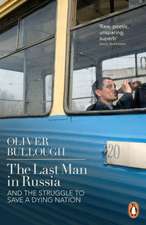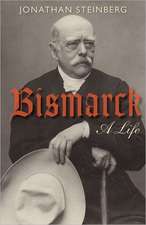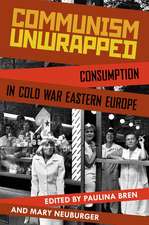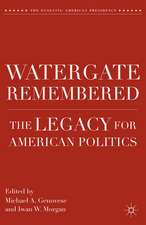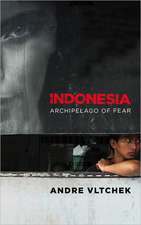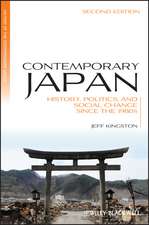Japan's Postwar: Nissan Institute/Routledge Japanese Studies
Editat de Michael Lucken Traducere de J. a. a. Stockwin Editat de Anne Bayard-Sakai, Emmanuel Lozeranden Limba Engleză Hardback – 7 sep 2011
Originally published in French, this new translation offers the English speaking world important access to a major work on Japan which has been greatly enriched by the translator’s great accuracy and knowledge of English, French and Japanese language, history and culture.
Japan's Postwar will appeal to students and scholars of Japanese Studies and Modern Japanese History as well as historians studying the world after 1945.
| Toate formatele și edițiile | Preț | Express |
|---|---|---|
| Paperback (1) | 488.92 lei 6-8 săpt. | |
| Taylor & Francis – 14 mar 2014 | 488.92 lei 6-8 săpt. | |
| Hardback (1) | 820.73 lei 6-8 săpt. | |
| Taylor & Francis – 7 sep 2011 | 820.73 lei 6-8 săpt. |
Din seria Nissan Institute/Routledge Japanese Studies
-
 Preț: 286.71 lei
Preț: 286.71 lei -
 Preț: 318.39 lei
Preț: 318.39 lei - 9%
 Preț: 1003.97 lei
Preț: 1003.97 lei -
 Preț: 289.07 lei
Preț: 289.07 lei - 25%
 Preț: 852.53 lei
Preț: 852.53 lei -
 Preț: 495.94 lei
Preț: 495.94 lei -
 Preț: 486.42 lei
Preț: 486.42 lei -
 Preț: 271.61 lei
Preț: 271.61 lei -
 Preț: 420.08 lei
Preț: 420.08 lei - 18%
 Preț: 1057.40 lei
Preț: 1057.40 lei -
 Preț: 464.54 lei
Preț: 464.54 lei -
 Preț: 414.39 lei
Preț: 414.39 lei - 18%
 Preț: 1003.30 lei
Preț: 1003.30 lei - 18%
 Preț: 1056.80 lei
Preț: 1056.80 lei -
 Preț: 465.69 lei
Preț: 465.69 lei -
 Preț: 415.24 lei
Preț: 415.24 lei -
 Preț: 485.46 lei
Preț: 485.46 lei - 14%
 Preț: 298.13 lei
Preț: 298.13 lei - 18%
 Preț: 1061.57 lei
Preț: 1061.57 lei - 18%
 Preț: 1105.56 lei
Preț: 1105.56 lei - 18%
 Preț: 1055.69 lei
Preț: 1055.69 lei - 18%
 Preț: 1058.79 lei
Preț: 1058.79 lei - 18%
 Preț: 1165.24 lei
Preț: 1165.24 lei - 15%
 Preț: 538.45 lei
Preț: 538.45 lei -
 Preț: 415.67 lei
Preț: 415.67 lei - 28%
 Preț: 820.32 lei
Preț: 820.32 lei - 15%
 Preț: 511.27 lei
Preț: 511.27 lei -
 Preț: 492.11 lei
Preț: 492.11 lei - 18%
 Preț: 1271.47 lei
Preț: 1271.47 lei -
 Preț: 438.47 lei
Preț: 438.47 lei -
 Preț: 451.16 lei
Preț: 451.16 lei - 23%
 Preț: 342.12 lei
Preț: 342.12 lei -
 Preț: 408.54 lei
Preț: 408.54 lei - 18%
 Preț: 948.21 lei
Preț: 948.21 lei -
 Preț: 412.37 lei
Preț: 412.37 lei - 27%
 Preț: 1001.60 lei
Preț: 1001.60 lei - 18%
 Preț: 1061.57 lei
Preț: 1061.57 lei - 28%
 Preț: 849.77 lei
Preț: 849.77 lei - 18%
 Preț: 1053.16 lei
Preț: 1053.16 lei - 18%
 Preț: 1390.04 lei
Preț: 1390.04 lei - 18%
 Preț: 777.75 lei
Preț: 777.75 lei
Preț: 820.73 lei
Preț vechi: 1103.29 lei
-26% Nou
Puncte Express: 1231
Preț estimativ în valută:
157.07€ • 163.37$ • 129.67£
157.07€ • 163.37$ • 129.67£
Carte tipărită la comandă
Livrare economică 15-29 aprilie
Preluare comenzi: 021 569.72.76
Specificații
ISBN-13: 9780415605380
ISBN-10: 0415605385
Pagini: 314
Ilustrații: 10 b/w images, 3 tables and 10 halftones
Dimensiuni: 156 x 234 x 25 mm
Greutate: 0.5 kg
Ediția:1
Editura: Taylor & Francis
Colecția Routledge
Seria Nissan Institute/Routledge Japanese Studies
Locul publicării:Oxford, United Kingdom
ISBN-10: 0415605385
Pagini: 314
Ilustrații: 10 b/w images, 3 tables and 10 halftones
Dimensiuni: 156 x 234 x 25 mm
Greutate: 0.5 kg
Ediția:1
Editura: Taylor & Francis
Colecția Routledge
Seria Nissan Institute/Routledge Japanese Studies
Locul publicării:Oxford, United Kingdom
Public țintă
Postgraduate and UndergraduateCuprins
Introduction Part 1: The Multiplicity of Chronologies, or The Postwar as Focus 1. The Postwar as Political Paradigm 2. The Evolution of the Concept of ‘Postwar Education’ Part 2: The Intellectuals Facing the Future 3. Maruyama Masao, From Autonomy to Pacifism 4. At the Time, after the Defeat: Sakaguchi Ango, Takeda Taijun, Takeuchi Yoshimi (1946-1948) 5. Yasuoka Masahiro, a Conservative Vision of the Postwar Part 3: How Should One Speak? The Poets’ Response 6. ‘Genzai’, Here and Now 7. Speaking Silence: The Poetry of Ishihara Yoshirō Part 4: Forgetting, Commemoration, Perversion: The Regimes of Memory 8. The Literary Institution and the Case of the Akutagawa Prize 9. The ‘Statue for Peace’ in Nagasaki 10. Repression of History and Engagement of the Body Part 5: Complex Experiences: Society on the Road to Democracy 11. The ‘Red Purges’ and the Democratisation of Japan, 1949-196212 Labour Relations during the Years of High Growth 13. The Postwar for Workers’ Unionism and Movements Against Industrial Pollution
Recenzii
"Arthur Stockwin deserves commendation on his fine and eminently readable translation of the volume from the original French... The authors represented here enrich our knowledge on a number of fronts by drawing links between war and after, and thereby suggest different understandings and approaches of how to conceptualise and periodise postwar Japan." - Erik Ropers, Towson University; Japanese Studies (Australia), vol. 32, no. 4, December 2012.
Descriere
Historical surveys of postwar Japan are usually established on the grounds that the era is already over, interpreting "postwar" to be the years directly proceeding World War II. However, the contributors to this book take a unique approach to the concept of the postwar period and treat it as a network of historical time periods from the contemporary period, connecting these time capsules to the war to which they are inextricably linked. The book also takes a very interdisciplinary approach to examining post-war Japan and includes chapters centred around subjects as diverse as politics, poetry, philosophy, economics and art which serve to fill the blanks in the collective cultural memory that historical narratives leave behind. As such Japan's Post-War will appeal to students and scholars of Japanese Studies and Modern Japanese History as well as historians studying the world after 1945.




